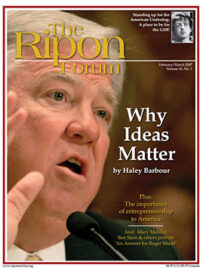The U.S. economy has enjoyed remarkable success during the past decade. Annual productivity growth has surged to a post-World War II high of nearly three percent, unemployment hovers near or below five percent, and inflation remains strikingly stable in the two to three percent range. Why? And how do we keep it up?
Some say the secret is information technology. But while statistically the IT revolution does account for the acceleration of U.S. productivity growth, it turns out that something else was the true spark of this revolution – the rise of innovative, entrepreneurial companies as major economic drivers in the United States. From Microsoft, Intel and Apple in IT to Home Depot and Wal-Mart in retail and Genentech and Amgen in biotech, entrepreneurial firms (whether large or still small but with promise) have been America’s primary economic transformers.
For years, the Ewing Marion Kauffman Foundation has supported public policy research related to entrepreneurship. We have found that the relatively small fraction of entrepreneurs who bring to market new or innovative products or services or means of producing or delivering them deserve special attention. Now, for the first time, we are bringing together our work and that of our grantees to develop tentative thoughts on policies that seem most conducive for maintaining, and ideally strengthening, our entrepreneurial economy.
First, a little history: Beginning more than a quarter century ago, a range of national policy changes lowered obstacles to innovation, increased the potential rewards of entrepreneurial risk taking, and facilitated and accelerated the U.S. shift toward entrepreneurship. These changes included:
- Removal of legal barriers to entry and price controls in a number of key industries, in particular transportation and telecommunications, whose subsequent declining costs made it easier for new firms to start and grow;
- Presidential Executive Orders requiring federal agencies to study costs and benefits of proposed regulations;
- Tax reforms that enhanced rewards for taking entrepreneurial risks, especially lowering capital gains tax rates and individual marginal rates;
- Permitting pension funds to invest in venture-capital partnerships; and,
- Legislation that accelerated (however imperfectly) commercialization of university research.
So what’s next? What policies should America adopt now to keep these good times of rising productivity, employment and income rolling? To answer this question, we asked the editors of Inc. magazine to assemble a group of successful entrepreneurs with an interest in public policy and find out what specific challenges to future entrepreneurship they thought confronted the United States. We added to the formal feedback we obtained from about 20 of these individuals the insights we have gained over the years through our extensive interactions with entrepreneurs and those who finance them.
Four topic areas stand out from these discussions. Here they are, and the policies we currently believe that best respond to the concerns in each:
- Ensuring a Skilled Workforce: Successful entrepreneurs tell us that the biggest constraint on their growth and on the formation and growth of successful enterprises in the future is finding “talent” – that is, skilled individuals with an entrepreneurial bent. Big business also faces the same challenge. Meeting it will require improvements and innovation throughout our educational system (K-12 and higher), as well as more enlightened immigration policies. America especially needs more highly skilled foreign workers who want to be part of new businesses here.
- Promoting Commercialization of Innovation: This requires action on several fronts: enhancing government funding of research in basic science and engineering (which have been relatively neglected of late compared to the large increases in funding in the health sciences); shifts in patent law so that protections are not overly broad and will not inhibit the creation of innovative, new firms; improving ways that university-developed ideas are commercialized; and funding efforts to identify and take advantage of innovations developed abroad, just as foreign companies have been doing with U.S.-based innovations for decades.
- Limiting Overly Burdensome Regulation and Liability Litigation: Because of their size, entrepreneurial firms often bear a disproportionate cost of excessive regulation and liability litigation. Accordingly, entrepreneurs have the most to gain from sensible reforms requiring all major federal (and state) regulations to be implemented only if estimated benefits exceed costs, and by adoption of further liability law reforms (without reducing incentives for all companies to make safe products). Three liability reforms are illustrative: adopting a federal product liability law to bring uniformity to and thus less uncertainty surrounding liability standards; limiting or prohibiting the award of punitive damages where defendants have complied with prevailing regulatory standards; and adoption of the “English rule” on attorneys’ fees (loser pays) for litigations involving commercial interests (to better discourage frivolous litigation).
- Reforming Health care: Escalating health care costs and uncertainties about future trends rank high on entrepreneurs’ lists of concerns. Big business is concerned as well, having to face global competitors from countries where health care costs are picked up by the government. Meanwhile, the fear of losing health insurance compounds workers’ anxieties about job loss itself and deters too many from leaving their current jobs to launch new enterprises.
The underlying source of all these concerns is that the overwhelming majority of Americans obtain their health insurance through their employers, rather than buying it on their own, as they do with insurance on their cars, homes and personal liability. This happened quite by accident – dating from attempts by firms during World War II to avoid wage controls by adding such benefits as health insurance to pay packages, and a ruling at that time by the Internal Revenue Service that employers could deduct health insurance costs for income tax purposes. Since then, employer-provided health insurance has exploded, and so has the cost of this tax exclusion to the federal Treasury – over $125 billion, and counting.
Successful entrepreneurs tell us that the biggest constraint on their growth and on the formation and growth of successful enterprises in the future is finding “talent”
If the central problem is the linkage between employment and health insurance, then the solution is equally clear: policy makers must find a way of breaking this connection. The President offered one way of doing this in his State of the Union address: extending tax deductibility to individuals who buy health insurance on their own, and financing it with a cap on employer provided health care. Conventional wisdom has it that this idea is “dead on arrival” with Democrats now in control of Congress. But the concept is a bold one, and putting aside the details of the President’s proposal, it clearly moves in the right direction from an entrepreneurial perspective. It also would help address worker and big business concerns as well.
Readers will notice that these topics and the policies they seem to imply reach far beyond the traditional subjects that policymakers in Washington and elsewhere discuss when thinking about how to promote entrepreneurship: increasing the budget of the Small Business Administration, or reserving a certain percentage of federal contracts for small business.
Indeed, the policies that are likely to be most conducive to truly innovative entrepreneurship – and thus to enhancing our rate of growth – are the broader policies that are or should be of concern to all Americans.
It is time for policy makers and citizens to recognize that what is best for innovative entrepreneurship is likely to be best for the economy as a whole.
Carl Schramm and Robert Litan are CEO and vice president, respectively, of the Ewing Marion Kauffman Foundation in Kansas City, Mo., the nation’s largest foundation devoted to promoting entrepreneurial success. This essay is excerpted from a new paper, “On the Road to an Entrepreneurial Economy: A Policy and Research Guide,” which can be downloaded from www.kauffman.org starting February 26.




